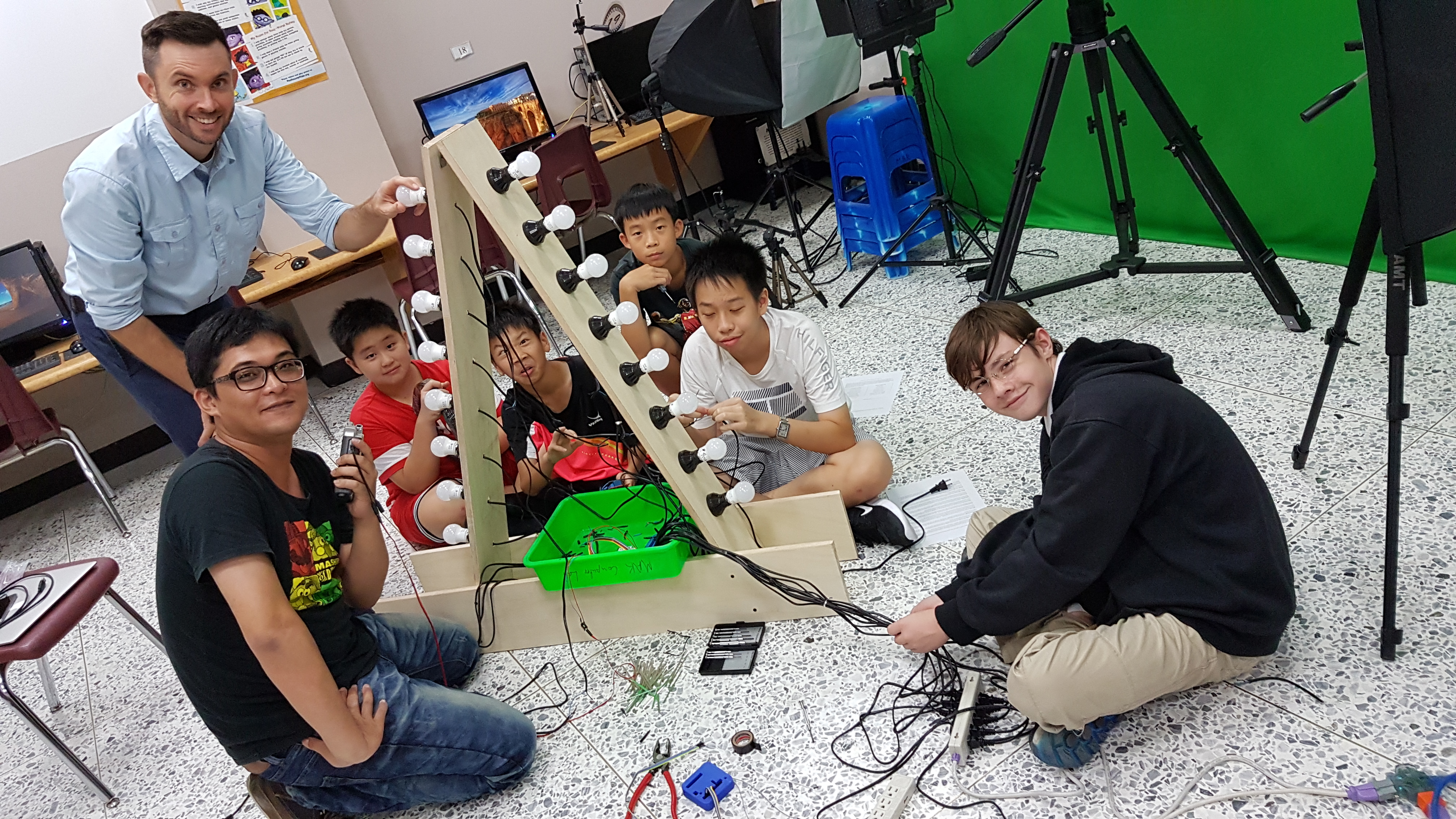Creating Takes Collaboration, Risk-Taking, and Passion 創作需要協同合作、冒險進取與熱情
 At MAK we believe that doing is a crucial component of true learning. Last month I touched on the action involved in our Christmas project and the audience afforded by our secondary research projects as part of doing at MAK. Another way we have being incorporating the doing component of learning this year is through our middle school Exploratory Courses.
At MAK we believe that doing is a crucial component of true learning. Last month I touched on the action involved in our Christmas project and the audience afforded by our secondary research projects as part of doing at MAK. Another way we have being incorporating the doing component of learning this year is through our middle school Exploratory Courses.
在馬禮遜,我們相信採取行動是真正的學習中一個關鍵的部分。上個月我參與了一個聖誕節計畫的行動,中學部研究計畫也做為這個計畫的一部份,向真正的別的學生、老師和家長演示。另一方面,今年我們將學習要素中的「採取行動」併入中學部的探索課程裡。
MAK has had middle school Exploratory Courses for years. I remember having a soccer ‘course’ as a middle school teacher in my first years at the school, which mostly amounted to a few drills and burning off some pent up energy at the end of the day with some of my middle school students. While this certainly wasn’t all bad, last year our middle school team began shifting our Exploratory Courses away from a ‘do something fun’ approach to a purposeful focus on creativity.
馬禮遜的中學探索課程行之有年。我記得我第一年來到這裡教書時,我是中學部的老師。當時我有門足球課,課堂是大多是做一些練習,和中學生們在學校結束之前消耗一些被壓抑的精力。這也不是什麼壞事,不過,去年我們的中學教學團隊開始將探索課程的上課方式從「做些有趣的事」變成專注在有目的性的創作力上。
Increasingly, creativity has been heralded in the last few years as an incredibly relevant and marketable skill for graduates to have. Traditionally, however, the idea of ‘play,’ which involves risk-taking and failure, is undervalued because students are afraid to get it wrong or create something that doesn’t quite work. Teachers are hesitant to allow for it in their classrooms because it takes time. But creation is invaluable. What better way is there to learn about cultivation than to try to grow a garden? What better way is there to learn about maps than to create one?
在過去幾年中,創造力已經慢慢地成為畢業生一個非常重要又有利於工作的能力。然而,傳統上卻低估了包含冒險與失敗的「玩」的概念,因為學生害怕失敗或創作些行不太通的東西,所以老師也不是很願意讓學生在課堂上做這些事情,做這些事太花時間了。但是創作是極富價值的。有沒有學習關於如何耕作比試著栽種一座花園更好的方法?研究地圖比自己創作一張地圖更好的方法是什麼?
In light of this, we have redesigned our Exploratory Course purpose and even the way we assign grades to include the following elements: Creating, Risk-Taking, Collaboration, and Passion. Our middle school staff has responded with some exciting new courses that encourage these elements.
有鑑於此,我們重新設計了探索課程的目的,而每一個評分的方式都包含了下列要項:「創造」、「冒險近取」、「協同合作」與「熱情」。我們的中學老師也反映了一些令人振奮的、提倡這些要素的新課程。
Board Game Design 桌遊設計
In the past, our board game quarter course was always a popular choice for middle schoolers, but here we’ve enhanced this option by adding the element of creation. Why do board games work? What are the different types of games that generate different appeal? Students in this Exploratory Course did play board games for parts of the course, but it was for the purpose of making a game based on type they most enjoyed. The driving question, of course, was: can I make a game as fun as the one I just played?
過去,我們每季的桌遊課總是中學生的熱門選項,但是如今我們把「創造」加入了這門課中,以加強我們的目的。為什麼桌遊能玩?不同類型的桌遊能產生什麼不一樣的吸引力?雖然這門探索課程的學生把玩桌遊當成課程的一部份,但這目的是為了設計遊戲,並以他們最喜歡的遊戲類型作為設計的基礎。當然,驅使他們前進的問題是:「我能不能做出一個像我剛剛玩的一樣有趣的遊戲?」
Theater 戲劇
The fine arts are and have always been about creation, risk, collaboration, and passion. Music, after all, is often the collective passion of a group, demonstrated to an audience, using sound. That’s inherently risky and collaborative! But this year we have been so excited to add theater to our MS fine arts program. In producing The Elevator Family, middle schoolers very publically performed in a way they hadn’t before. Mrs. McDillon and Ms. Zrinksy did a fantastic job of allowing middle schoolers the freedom to collaborate and to take ownership of their final performance.
美術作品總是與創作、冒險、協同合作與熱情有關。音樂也常是集合一個團體的熱情,使用聲音向觀眾演示。這就是冒險與協同合作的本質!但今年我們非常興奮地將戲劇加入中學部的美術作品項目中。在創作《電梯家庭》時,中學生們要用一種以前從沒有做過的方式公開表演。McDillon老師和Zrinsky老師做了非常棒的一件事,她們讓中學生們可以自由地合作,並讓他們在最終演出時擁有自主權。
MAKe Electronics: Aquaponics MAKe電子課程:魚菜共生系統
Middle school eletronics students used their programming and wiring skills to build an aquaponics system for the school. This system maintained a school of fish that fertilized a garden of vegetable producing plants. Our students developed the pump system that took the water from the fish to the plants based on a series of sensors embedded in the garden. Students had to solve a number of problems including powering the electronics, water flow, and algae management in order to get the system working.
中學部電子課程的學生運用他們程式設計與線路設計,為學校建立了一套魚菜共生的系統。這套系統能讓一群魚持續為菜園施肥。我們的學生透過內嵌在菜園裡一連串的感應器,發展出一個可以從魚池送水到植物端的幫浦系統。為了讓這套系統得以運作,中學生們必須解決一些像是給予電子產品動力、水流和藻類管理等等的問題。
DIY Instructables 手工具DIY課程
In our new Instructables course, students were given the opportunity to use tools, including some basic power tools, to build small projects, both independently and in groups. Final products included a floating basketball hoop, a soda can popcorn machine, string art, and bottle rockets.
我們新的手工具DIY課程中給予學生機會,使用像是一些包含簡單的、基本的動力工具來做一些小型的計畫。這可以是個人自己動手,也可以是小組一起做。最後呈現的成品中,包含了漂移的籃球框、一個蘇打汽水瓶做的爆米花機、釘板纏繞畫以及水火箭。
Biking 騎單車
Road biking has been a long-time favorite activity in Taiwan, and passion and risk-taking have always been part of that sport. However, creating and collaborating have not. In order to incorporate these elements, students in our biking course are asked to map their own routes and to figure out basic bike repair on their own. That takes collaboration and creativity! Just a couple weeks ago, our school staff received an email asking for broken or damaged bikes for the students in this course to work together to repair.
在台灣,公路越野已經是一項長久以來大家最喜歡從事的活動之一,熱情與冒險已經是這項運動的一部份了。可是,創作與協同合作卻不屬於這運動。為了要加入這些元素,我們要求參加這門課程的學生要規劃他們的路線,並自己找出基本的腳踏車維修方法。這就需要協同合作與創造力了!就在幾個禮拜前,全校的老師都收到了一封信,信中希望老師們能提供一些壞掉或是受損的腳踏車,讓參與這堂課的的學生可以一起合作維修腳踏車。
MAKe Electronics: Sound Meter MAKe電子課程:聲音感測器
In the first quarter, students learned the basics of electronics to trigger lights through a series of relays in response to audio input. The students not only learned about the electronics and C+ programming to make the system work; they also designed and build the sound meter. There were many trials and errors, but they made a sound meter that has been used for a number of school events!
在第一季中,學生學習了電力學的基礎知識並加以實作,他們以聲音做為觸發條件,控制燈源的開關。學生不只學習了有關電力學與C語言程式設計來使系統得以運作,他們也設計並實際做出了一台聲音感測器。這當中雖然有許多的考驗及錯誤,可是他們真的動手將聲音感測器做了出來,並在一些學校的活動中使用它。
The Exploratory Courses listed above are far from the only options. Since the beginning of the year, our middle schoolers have also chosen from other options including art journaling, choir, art fundamentals, orchestra, World Scholar’s Cup, band, broadcasting, outdoor camping, tech fundamentals, cooking, painting, and blogging. In each of these options our teachers have been modeling for students that learning is about exploring and creating just as much as it is about hitting the books.
上面所羅列出來的探索課程絕非唯一的選擇。因為這學年才剛開始,所以我們的中學生們也已經選了其他的課程,像是藝術日記、合唱團、藝術基礎、管弦樂團、世界學者盃、樂團、廣播、野外露營、科技基礎、烹飪、繪畫和撰寫部落格。在每一個課程中,老師已經為學生示範了學習是關於探索與創造,而且它所佔的份量與唸書一樣多。